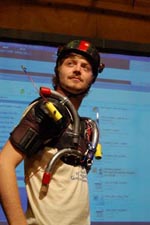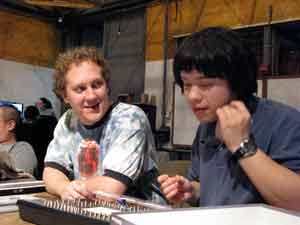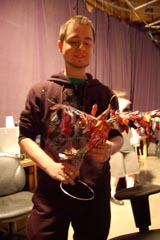 The Uncanny: Things,
situations, sounds, and discourses that give you the creeps. Beginning
with Freud's theory of the "Unheimlich", the Uncanny Valley effect in
extreme digital animation, Nineteenth Century fascination with spirit
communication, and technology in science fiction/fictions of science,
we'll study and practice making things that evoke that sense of
something hovering just beyond comprehension.
The Uncanny: Things,
situations, sounds, and discourses that give you the creeps. Beginning
with Freud's theory of the "Unheimlich", the Uncanny Valley effect in
extreme digital animation, Nineteenth Century fascination with spirit
communication, and technology in science fiction/fictions of science,
we'll study and practice making things that evoke that sense of
something hovering just beyond comprehension.
Extreme Freestyle Hacking: Investigation of hacking as the political art of "detournement" in all facets of society. The way we modify things to make them to things they aren't supposed to do.
Trans:
Dangerous border violations. Transformation and change, boundary
theory, transgender, gender and sexuality in the large and its
relation to positionality and flow; identity.
Postmodern
Gothic : Monsters, desire, and epistemic
rupture. Theories and histories of the gothic, modern goth,
vampires, monsters and the monstrous, genetic engineering, gender
and sexuality, delirium, postmodernity, cyborgs.
: Monsters, desire, and epistemic
rupture. Theories and histories of the gothic, modern goth,
vampires, monsters and the monstrous, genetic engineering, gender
and sexuality, delirium, postmodernity, cyborgs.
Performance (Taking It to the Street): Practicum in culture hacking with a documentary component. Performance and the performative, performance as political intervention, history and theory of theatre, masks, puppetry, spectacle, ritual, street theatre.
When
Cultures Collide: Building multinational
virtual communities for purposes of social
transformation. Language and episteme, cultural difference,
subaltern discourses, orientalism, mestiza consciousness.

Disruptive Technologies What constitutes
disruptive technology, history of disruptive technologies, techniques
of intervention, oppositional and emergent discourses, subversion and
media, political power and postmodernity, hypothetical future
medias.
Soundscapes: Theory and practice of audio installation, multitrack recording, history of "music" (in the sense described by John Cage).
Dream/Delirium: An exploration of the space between waking and dream states. Consciousness continuums and the creative discoveries that emerge from this space. Where do dreams end and realities begin?
Blackbox: An advanced course intended for students who have taken at least one ACTLab course and are familiar with our unusual expectations and requirements. Students electing Blackbox should already have completed at least three projects and their ACTLab website. Topics vary and may be determined in consultation with students enrolled in the course. The course includes an intensive component in ACTLab methods: how to build an ACTLab program and teach ACTLab courses.









 There are twelve ACTLab New Media courses, and we offer three of
them per semester. Each is a combination of theory and making,
with emphasis on making and the role of the whole body in the
learning process. Ideally, six of the twelve courses make up
a rich New Media sequence in which we cover almost everything we
think you need to know in order to be an interdisciplinary
practitioner in New Media production and studies. You'll find
suggestions for a complete New Media course of study below.
There are twelve ACTLab New Media courses, and we offer three of
them per semester. Each is a combination of theory and making,
with emphasis on making and the role of the whole body in the
learning process. Ideally, six of the twelve courses make up
a rich New Media sequence in which we cover almost everything we
think you need to know in order to be an interdisciplinary
practitioner in New Media production and studies. You'll find
suggestions for a complete New Media course of study below.